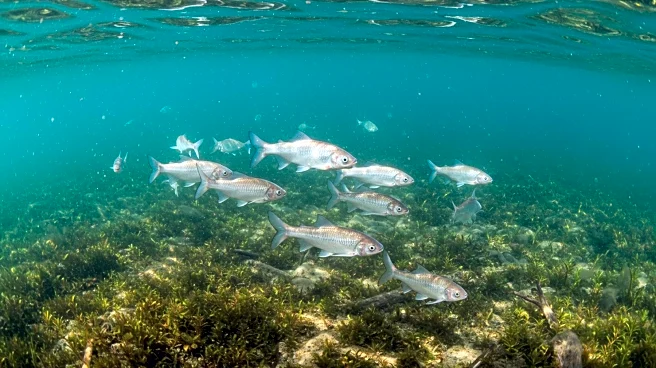What is the story about?
What's Happening?
Researchers are urgently working to restore the whitefish population in Lake Michigan, which is threatened by invasive mussels and climate change. The whitefish, a culturally and economically significant species, has seen its numbers drop to between 1% and 10% of historical highs. Invasive quagga and zebra mussels have disrupted the food web by filtering out plankton, essential for young whitefish. Additionally, warming waters have reduced ice cover, further endangering whitefish eggs. Efforts to combat these threats include strict fishing quotas and innovative tracking methods, such as close-kin mark-recapture, to better understand population dynamics.
Why It's Important?
The decline of Lake Michigan's whitefish population poses significant economic and cultural challenges. Whitefish are a key component of the Great Lakes' $5.1 billion fishing industry, supporting local economies and cultural traditions. The invasive mussels' impact on the food web threatens not only whitefish but the broader ecosystem. Addressing these issues is crucial for maintaining biodiversity and the livelihoods of those dependent on fishing. The situation highlights the need for effective environmental management and funding to combat invasive species and adapt to climate change.
What's Next?
Researchers and local authorities are exploring various strategies to mitigate the decline of whitefish populations. These include incubating whitefish eggs in nutrient-rich tributaries and raising fish in natural ponds to enhance genetic diversity. Continued funding and collaboration between state, federal, and tribal agencies are essential to develop sustainable solutions. The success of these efforts will depend on balancing ecological restoration with economic interests, ensuring the long-term viability of the Great Lakes' fishing industry.
Beyond the Headlines
The whitefish decline underscores broader environmental challenges facing the Great Lakes region, including invasive species management and climate adaptation. It raises ethical questions about human intervention in natural ecosystems and the responsibility to preserve cultural heritage. Long-term solutions may require innovative approaches to ecosystem management and increased public awareness of environmental issues.
















